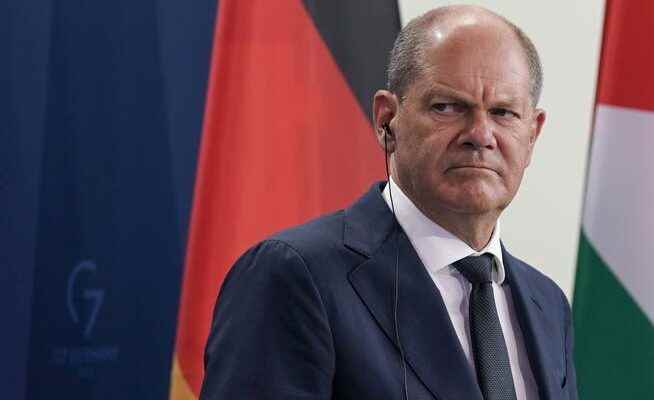It took the chancellor half a day to express his outrage at Palestinian President Mahmoud Abbas’ anti-Jewish blunders. That’s unbelievable. With his communication style, Scholz is damaging Germany’s reputation.
Grim face to the silent game: host Olaf Scholz on Tuesday in the Federal Chancellery.

Alexander Kissler is the political editor of the NZZ in Germany.
You are reading an excerpt from the weekday newsletter “The Other View”, today by Alexander Kissler, editor in the Berlin office of the NZZ. Subscribe to the newsletter for free. Not resident in Germany? Benefit here.
Olaf Scholz credits his “efficient style of communication”. A few days ago, the German Chancellor used the 80th birthday of the publisher Friede Springer to praise her for her own cause. Less than 24 hours later, however, Scholz caused a communicative meltdown.
He stood by silently when Mahmoud Abbas, President of the Palestinian Authority, vilified Israel and put the Holocaust into perspective in the Berlin Chancellery. All subsequent explanations cannot change the fatal impression of this silence: Scholz made a fool of Germany. His confessions to the country’s special responsibility for Israel turn out to be lip service.
Scholz should have spoken
At the beginning of March, during his first visit to Jerusalem, Scholz confirmed that Germany would “continue to stand firmly on Israel’s side”. Every federal government has an “everlasting responsibility for the security of the State of Israel and the protection of Jewish life”. And now the head of the household stood in the chancellery at the side of the head of a corrupt authority and only acknowledged hatred of Israel with a scowl.
In Abbas’ words, Israel “to date has committed 50 massacres in 50 Palestinian villages and towns – 50 massacres, 50 holocausts.” He described Israel as an occupier with a National Socialist spirit. A few moments later, government spokesman Steffen Hebestreit ended the press conference. Scholz shook Abbas’ hand. That too was a mistake. Scholz should have exercised his domiciliary rights and had to speak. Instead, the Chancellor announced 15 hours later on Twitter that he was “deeply outraged by the unspeakable statements of the Palestinian President”.
An outrage that takes half a day to find words is not outrage, but an attempt to somehow limit the self-inflicted damage. Scholz wants to make the Germans believe that he just didn’t want to disturb the minutes of the press conference, and he probably suspects that nobody will buy it anyway. The government spokesman later takes the error “on his cap”. That’s loyal, but of course it doesn’t relieve the boss.
Is the disinterest in Israel authentic?
What do you think of a chancellor who offers an anti-Semite the stage and then behaves like an extra himself? It’s no use summoning the Palestinian representative to the chancellor’s office the next day.
And where is that quality that the government spokesman praises in his boss? In the federal government podcast, Hebestreit praises Scholz’s authenticity: “It is much more felt what a politician is than listening to what exactly he says.” Scholz is authentic and an “experienced man who says what he says”.
This statement now sounds doubly bitter: If Scholz is authentic, as his spokesman claims, then the deliberately silent chancellor would be authentic in his disinterest in Israel’s well-being. The country is obviously not a matter close to his heart. So Israel shouldn’t rely on Scholz. The Central Council of Jews and the Jewish Student Union rightly declare his silence scandalous and intolerable.
More than a billion euros for the Palestinians
When it was not yet clear which course the press conference would take, Scholz read friendly sentences from the slip of paper: he was grateful for the first personal conversation with Abbas, he called the relationship “close and diverse”, the “good cooperation” would continue . In fact, the good cooperation consists in the fact that millions and millions of euros are transferred to the Palestinian Authority and other organizations in Palestine.
Germany is not the only donor country, of course. But according to the Foreign Ministry, it is “one of the largest donor countries” and in 1994 it was the first country to open a “representation office” in the Palestinian territories. The sums flowing from Berlin to Ramallah are enormous. In 2020 alone, “the Palestinian population was supported with a total volume of around 193 million euros”. Since the beginning of the 1980s, a total of more than 1.2 billion euros have been spent on “bilateral projects in Palestine”; Added to this is the German share in numerous international development programs.
In addition to useful projects, the money can also be used to finance anti-Semitic textbooks or the pensions of the relatives of assassins. The scandal in the Chancellery should be an opportunity to end this checkbook diplomacy. A regime that agitates against Israel and rewards anti-Jewish terror does not deserve German tax money.
